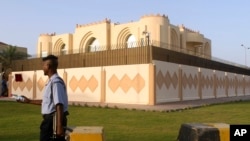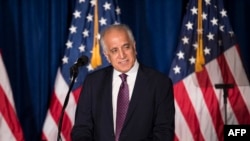The United States and the Taliban held a new round of direct talks this week in Qatar, where the two sides agreed to continue the dialogue process to promote a negotiated settlement to the 17-year-old war in Afghanistan.
A Taliban spokesman, while announcing details of Friday’s meeting, the second in less than three months, said that U.S. special envoy for Afghan peace Zalmay Khalilzad led his delegation and Sher Mohammad Abbas Stanikzai, who heads the Taliban’s “political office” in the Gulf state, led his six-member team in the talks.
Taliban representatives told the American delegation the presence of foreign forces in Afghanistan is a “major” obstacle to a way of finding the “real” peace, said Zabihullah Mujahid in a statement he sent to media, including VOA.
“Afghanistan is an Islamic nation, having its own Islamic values and culture. It is imperative to keep those in mind for finding a genuine and inclusive Afghan solution,” he quoted Taliban chief negotiator Stanikzai as emphasizing to American interlocutors.
There was no immediate U.S. reaction to Saturday's assertions by the insurgents.
Washington has neither confirmed nor denied the Qatar meeting, which came amid a renewed push by U.S. President Donald Trump’s administration to bring the Taliban to the negotiating table for peace talks with the Afghan government.
The U.S. last month appointed Afghan-born Khalilzad as its special representative for Afghanistan reconciliation. He began his official trip to the region a week ago that took him to Kabul, neighboring Pakistan, the United Arab Emirates, Saudi Arabia and Qatar.
“I think any time we’re there on the ground we’re making headway,” State Department spokesperson Heather Nauert told reporters on Thursday when asked whether Khalilzad was making any progress in the Afghan peace talks. “This is something that will be Afghan-led, Afghan-owned, but supported by the U.S. government," she said.
Khalilzad met with Afghan President Ashraf Ghani in Kabul Saturday and briefed him on his trip to the four nations, including Qatar, the presidential office said. It added that the U.S. envoy reiterated Washington’s support for “Afghan-led and Afghan-owned peace process.”
The U.S. embassy, in a Saturday statement, said Khalilzad returned to Kabul for “follow-up” meetings with the Afghan leadership and civil society representatives to hear their “views and priorities” on a settlement to the conflict. It did not mention anything about the U.S. envoy's meeting with the Taliban.
“The United States shares the aspirations of all Afghans for a peaceful Afghanistan where all Afghans see themselves included. All citizens of Afghanistan must be a part of this reconciliation process,” the statement quoted Khalilzad as saying.
In late July, Alice Wells, the State Department deputy assistant secretary for South and Central Asia, met Taliban officials in Doha for “preliminary” discussions amid persistent insurgent demands for direct negotiations with Washington. Taliban spokesman Mujahid at the time had described the talks as “productive and positive.”
The U.S. has long maintained that it is ready to facilitate and sit at the table as an observer but any peace talks with the Taliban will have to be an Afghan led and Afghan owned process for achieving a sustainable solution.
The Taliban refuses to engage in direct talks with the Kabul government, dismissing it as “stooges of America. The insurgent group has been calling for direct talks with the U.S., blaming Washington for starting the Afghan war.
A U.S.-led international coalition ousted the Taliban from power in 2001 for harboring al-Qaida leaders who allegedly plotted the September 11 attacks on American cities that year. The Taliban currently controls or contest nearly half of Afghanistan and it continues to inflict heavy casualties on Afghan security forces, bringing more territory under its control.





